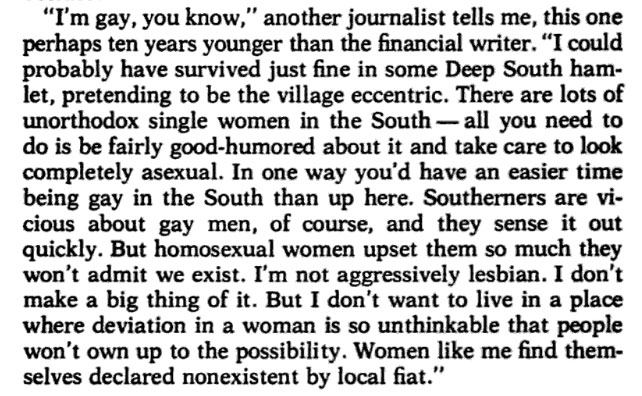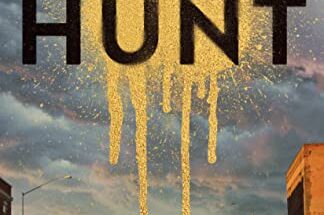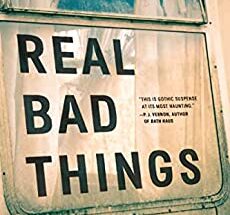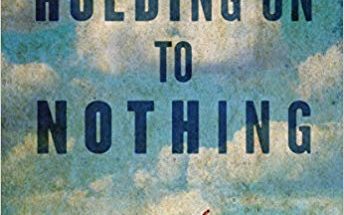My fellow Dead Darlings contributor and site editor, Cara Wood, sent along these questions in anticipation of the launch of my debut novel, Cottonmouths, on June 6, 2017. Echoing the work of authors like Daniel Woodrell and Sarah Waters, Cottonmouths is an unflinching story about the ways in which the past pulls us back . . . despite our best efforts to leave it behind.
How did the idea for this book originate?
Desire and crime were obsessions from my youth. I was addicted to my Grandma Ford’s historical romance novels (the more tragic, the better) and my Grandma Sue’s Crimes and Punishment: A Pictorial Encyclopedia of Aberrant Behavior (ask me about my Richard Speck night terrors!). My grandmas were rivals at the Maybelline factory in Little Rock, which heightened the drama for me.
I had been circling around the idea of desire and crime in novel form since about 2000. During that timeframe, I visited some college friends and they told me about how a bunch of meth labs had started popping up around town. The main thoroughfares have nicknames: Burger Row, Church Row… now, Meth Row. I didn’t laugh about this Row the same way I did with the others. People close to me have struggled with and sometimes lost battles with their various addictions. There’s a lot of darkness and depression behind the curtain of southern charm or redneck veneer (pick your poison).
Soon thereafter, during a trip to Alaska to visit my aunt, I was ghosted by a girlfriend (and eventually dumped). While I stared out the car window at glaciers, toothpick forests, and bore tide inlets with quicksand qualities, I was distracted from my relationship pains by my aunt’s stories of drugs and death from her days working in a morgue and her general interest in the macabre, such as all the ways people can die in Alaska.
All those childhood obsessions, lovelorn thoughts, and the drug and death conversations coalesced into a story I worked on that eventually became the genesis for Cottonmouths.
Tell us about the love story that’s at the center of your novel. What’s your advice for writers who want to depict realistic, resonant relationships?
A young woman’s desire for a friend from her youth consumes her. The friend has teased her affections in subtle ways over the years, creating this push/pull of desire and wanting to be free of her. Complicating matters, she’s financially burdened and she’s queer, but not necessarily in the closet. Her parents and most in town suspect that she’s a lesbian. But it’s an unspoken agreement that nobody talks about it. That felt very real and familiar to me.
Growing up, we all knew that a family member was gay but we never talked about it. And Grandma Ford yelled at my cousins and me if we called each other “gay.” That was our version of tolerance. Fast forward ten years or so and I realize that, oh, I’m gay, too. There’s a quote I read way back when I was coming out that I keep on my desktop:

Though this quote is from a different time, without the internet and where one was more isolated from other LGBTQ individuals, it resonated with me. Before I moved to Boston, I was barely aware that there was such a thing as a lesbian. I was truly straight off the turnip truck and didn’t even have a name for the painful crush of feelings I felt for some female friends in my youth. I assumed that I was weird and needy (which is not untrue, tbh).
There are a lot of excellent coming out narratives, but I hadn’t read much about what it’s like to be sort of out yet also invisible. Even today, as an out married woman, there’s a “Boston Marriage” vibe you get from folks, even friends and family. You’re just really close friends — your sexuality and its associated discrimination are stripped until something happens and they’re like, “OH, right. You’re gay. This thing in the world actually affects you.” I didn’t write this novel to get the story out in the world. I wrote this novel to get the story out of me.
As for writing such narratives: Get your heart broken often and deeply?
Regardless of personal experience, you have to understand and inhabit the characters. It’s no different than other writer research. I think sometimes writers get squeamish about love and relationships. The topic is not big enough or it’s not cool. Who cares about love? Yet, it’s the ultimate quest. We seek it from the moment we are born until we die. Our lives are shaped by the love we’re given and have received, or have not been given and have not received. I think respecting and honoring that (I can’t believe I just said that, but you know) is important to creating resonance. And more than making something realistic, I think it’s important to make the relationship believable to readers.
And if you have trouble tapping into love and desire, my editor (the amazing Chelsey Emmelhainz) recommends listening to Adele. I have a pre-writing playlist I use to “get in the mood” for whatever scene I need to write.
Which authors and other works helped shape and influence Cottonmouths?
The works that have had the greatest impact on me as a person and a writer are The Awakening by Kate Chopin and The Passion by Jeanette Winterson. I read and have reread them at points in my life where I struggled with either staying in a relationship or emotionally releasing people who didn’t want to stay with me. Desire and longing is thick in each one, and the endings are powerful and true to the characters.
I’m madly in love with Jeanette Winterson’s work. Though I don’t — and can’t possibly — write like her, her characters, settings, and tone have lodged themselves inside of me. I swoon at the sentence level. When I read good work, it challenges me to do better, to be better every time I sit down to write.
Love Boat and Fantasy Island also juiced my creativity as a child. I’d remiss not to include that.
Are there any parts of Cottonmouths that feel especially autobiographical to you now? How did you find that line between drawing on what you know and sourcing/researching the parts of your book where you didn’t have experience?
While prepping for a class on characterization last week, I read a quote that I now can’t find about how all stories hold autobiographical elements to them. Early drafts of Cottonmouths had more of these elements because I was learning and was so used to pouring out my pain in poetry filed away in my own personal deep web. I am full of feelings, and that has often felt like an albatross, especially in professional environments. Rather than bemoan it, I often draw on that deep well of feelings and memories to get a scene down, especially the more emotional ones. But the accidentally autobiographical elements have mostly been stripped through years of editing.
The emotional torment of love and longing remains. That’s where the autobiographical elements end. My crime sprees ended around the age of 10. Though, my family does have a criminal contingent that offers endless inspiration. (I can’t talk about it. Code of southern silence and all.)
Still, little details from life or stories my friends have told me pop up here and there throughout the book, such as getting in trouble for using too much toilet paper. This detail has resonated with many of my beta readers. I keep what works for the story and discard what feels self-indulgent.
For research outside of my realm of experience, I read a ton of articles and white papers that have likely put me on a watch list. Meth production was a whole other challenge, mostly because pop culture has been there and done that. Meth narratives often reduce people to hillbillies and junkies and outlandish drug lords. There’s a place for that and I enjoy those narratives as well. But meth is a piece of this story, not the focus. Knowing people whose lives have been affected by it made me want to explore emotional and financial hardship more than mechanics. But I also wanted to “get it right” as much as possible. Hence, research.
How much time did you have to spend with chickens to get the farm scenes right? In other words, tell us about the importance of setting and its inspiration from your life as a mid-Westerner.
Don’t tell an Arkansan they’re not southern. You might get shot.
The only time I spend with chicken is at the dinner table, preferably fried and from Bisq. However, I researched chicken house structures to ensure the details were correct. One of my close friends in high school had a chicken house on her property. It was near the end of the road, so anytime we passed it going to or from town, I held my nose because it smelled so awful. You never forget the smell. (My friend smelled nice, btw.)
I didn’t need to dive too deeply for the setting. I grew up in both a small industrial town and the woods. According to my mom, I was a holy rolling Southern Baptist at the age of 5, but I slowly shed my religion after years of moving, not being able to settle in one place, and seeing a lot of hypocrisy that did not sit well with me. Church peer pressure is strong in the South. And for my characters, especially a lesbian protagonist, religion is oppressive. The characters and the setting helped me create conditions for a claustrophobic pressure cooker of societal and religious expectations.
Looking back on your experiences from first draft to awaiting book launch — what was the most surprising thing about the whole journey?
When I speak to writers who are at the beginning of drafts for first novels and tell them how much I’ve revised and how little I kept from the 1st draft (10%, if that), their eyes go wide and they often groan. No one wants to hear that all those hours and words may not make it to the final draft that goes to the printer — the mother of all printers versus the one in your house or at work.
When you’re at this place of waiting for the hardcover and see where you started and where you ended, it’s pretty incredible to see how much has changed and how much work you’ve put into it. You didn’t give up. You didn’t put the manuscript in a drawer (or you took it out, again and again). You wrote, you submitted, you listened, you revised . . . rinse and repeat until one day you’re writing a Q&A for your debut novel.
What’s the best advice you’ve gotten from other authors in your community about what to expect as a debut author?
I’m lucky to be in a fantastic writing community thanks to GrubStreet Writing Center — and specifically, the Novel Incubator program — so I have access to published writers who have already gone through the process and graciously share their experience. The most helpful advice they’ve had is when I send them tortured emails with subject lines such as: Is this feeling normal?
Publishing a debut novel is thrilling. It’s the accomplishment of goals, the fulfillment of dreams. But… I’m a project manager by trade. I like order. I like predictable and repeatable processes. There’s so much about the process of publishing a book that leaves you scratching your head, at how abnormal, unreal, and sometimes chaotic it feels. And there’s the element of living an average life with average complaints and minimal extroversion. Then, it’s like those HTML classes in computer cafes from the ’90s (remember those?) when you create your first website: HELLO WORLD.
A bit terrifying. Is this normal? Yes. Yes it is.
I’m pretty sure you’ve confessed to being a TV show binger… What about the format of cliffhanger TV dramas helped shape how you look at pacing and plot in the novel format? What show are you binging on now?
I have zero shame about my love for TV. You’ll have to take my stories from my cold, dead hands.
More than pacing or plot, I think that TV shows, when done well, can help you with characterization. There’s so much that an actor has to convey. But it’s more than dialogue and gestures. Think about Frank and Claire Underwood, Omar Little, Walter White. We keep watching because we fall in love with the characters, not the plot lines. At least that’s the case for me. I watch for the characters, even if the plot is absurd at times. Those actors bring subtlety and nuance to the characters they portray. That’s what I want to capture in writing: how can I make someone want to stay with this character over 300+ pages? If I’m not in love with the characters, I can’t expect someone else to be in love with them.
I’m currently revising novel two, so I’m binging old seasons of Project Runway. I need to hear Tim Gunn say “Make it work!” on a daily basis.
What can you tell us about your upcoming book launch events? The one question you hope you get asked by readers?
My book launch will be held at Harvard Book Store on June 8, with an after-party of some sort. I’m thrilled to hold my first reading at my local bookstore. It’s where I spend all of my (and my wife’s) money. I’ll also be appearing locally here and there. You can find an updated list of events at http://kellyjford.com/events/.
I’m pretty much open to any question by a reader unless it contains simple math. Then: hard pass.
Be sure to enter to win an Advance Reading Copy of Cottonmouths through Goodreads. Submissions end March 22, 2017.




2 comments